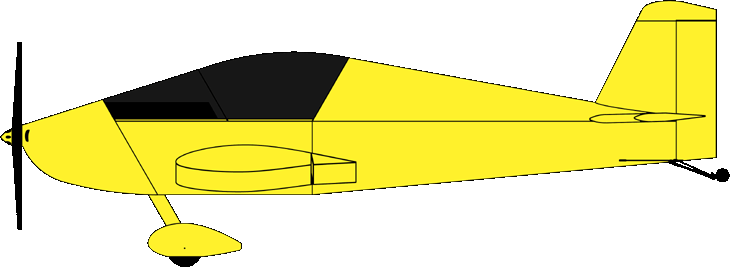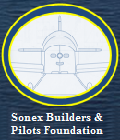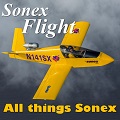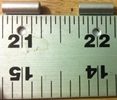

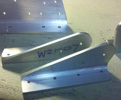
random user submitted photo
Turbo - Static MAP vs. in-flight MAP?
Turbo - Static MAP vs. in-flight MAP?
Hi All,
So now that my engine is back together and running well with no more oil pressure problems, I have run back into the initial issue I found when I was tuning my Aeroinjector: at WOT I get static RPMs of 3050-3080, but MAP only maxes at about 35.5" (this is on an MGL Discovery Lite iEFIS, using an RDAC XF-MAP on the firewall). Repeated runs under different conditions result in nearly identical results - the RPMs are always within about 30 and the maximum MAP I see varies by less than 0.2".
How does this compare with those of you successfully running a Turbo? Do you get 40" of MAP with the aircraft sitting still / tied down?
My engine feels really strong and I am hitting this RPM & MAP limit with a little bit of throttle travel remaining. Based on feel, its between 1/8" and 1/4" of throw left after the MAP hits this max and advancing the throttle that last bit doesn't change either the RPM or MAP. The AeroVee Turbo manual states that you should abort takeoff if you don't see 40" of MAP at WOT, so I've been assuming I have an issue lurking somewhere that's preventing full thrust. But try as I might, I can't find it. Here are the things I've checked:
Have I missed anything? Am I overthinking this and I'll see plenty of MAP once I button up the airplane and start taxi tests?
If I should definitely see 40" of MAP with the airplane tied down, I can think of two more steps to take:
What do you think of these steps? Good? Crazy? Any other bright ideas from those of you who have actually flown the turbo or worked on one?
Thanks,
--Noel
So now that my engine is back together and running well with no more oil pressure problems, I have run back into the initial issue I found when I was tuning my Aeroinjector: at WOT I get static RPMs of 3050-3080, but MAP only maxes at about 35.5" (this is on an MGL Discovery Lite iEFIS, using an RDAC XF-MAP on the firewall). Repeated runs under different conditions result in nearly identical results - the RPMs are always within about 30 and the maximum MAP I see varies by less than 0.2".
How does this compare with those of you successfully running a Turbo? Do you get 40" of MAP with the aircraft sitting still / tied down?
My engine feels really strong and I am hitting this RPM & MAP limit with a little bit of throttle travel remaining. Based on feel, its between 1/8" and 1/4" of throw left after the MAP hits this max and advancing the throttle that last bit doesn't change either the RPM or MAP. The AeroVee Turbo manual states that you should abort takeoff if you don't see 40" of MAP at WOT, so I've been assuming I have an issue lurking somewhere that's preventing full thrust. But try as I might, I can't find it. Here are the things I've checked:
- AeroInjector tuning - Its dialed in pretty close. I can do high-idle checks around 1600 RPM and get a noticeable rise in EGT and a small RPM rise when I pull the mixture through 1/2 to 3/4 of its travel. Similarly, at 2200 RPM I'm seeing reasonable EGT values (~1100) and can get a moderate rise in EGT values and a small RPM bump around 1/2 travel of the mixture control knob. Its hard to track the EGT rise at WOT as the engine heats up pretty fast when tied down and you can't really let the EGTs settle in; but I know I'm in the ballpark.
- Air filter - I'm using a K&N. I've tried with the filter on, and I've also tried with the filter off. Having the filter off definitely results in a little bit more intake air as I had to richen the AeroInjector after taking the filter off. But after re-tuning I hit the _exact same_ RPM & MAP limits.
- Timing - I'm getting a 70-80 RPM drop during my secondary ignition check. The manual says to aim for 50 rpms; so its not perfect. But I can't see that small bit of timing causing such a large MAP shortage.
- Turbine condition - I've taken the exhaust end off and spun the turbine by hand. It doesn't feel like it has any drag/resistance. I wouldn't say it sits there and spins for a long time after I flick it, but it rotates free & easy when I manipulate it. And I'll note that the MAP limit I've been hitting showed up since my very first full-throttle run (with only ~5-10 minutes of time on the engine at that point).
- Wastegate cover - There are light exhaust deposits and specks of rust inside the turbo housing & cover, but the seating surfaces still felt pretty smooth.
- Wastegate actuator arm - I initially had this fitting "loosely" on the wastegate arm due to the note about pre-load in the instructions. But after reading some past messages on the board I shortened it so a very slight bit of tension is required to slide the actuator arm onto the wastegate lever. Sadly there was no real difference on the next engine run (and yes, I made sure to tighten the lock-nut after the adjustment).
- Wastegate actuator spring - I've tried to test this, but the PSI required is so low that its very hard to be accurate. I used a regulator on my air compressor line to choke the flow down to a trickle, and used a tire-pressure gauge to ensure I was getting right around 2 PSI. This amount of pressure causes the actuator to wiggle a tiny amount. Its very subtle so I can't tell if that's enough to cause the wastegate to start bypassing the turbine. Sadly the next steady pressure I can get to with my regulator is somewhere around 7-10 PSI, definitely above the actuating range and the arm quickly and smoothly opens at this level.
- Exhaust leaks - I'm seeing no sign of exhaust deposits or discoloration near any fitting, and all bolts are tight.
- Intake - All of the intake tubing and MAP sensor tubing appears well-seated and the hose clamps are torqued down tight. I've run the engine for a total of almost an hour (in ~5 minute increments to keep CHT temps down below 375) and see no blue fuel markings on tubing, or other evidence of intake leaks (i.e. lean starting/idling issues, inconsistent mixture results, surging, etc).
- Oil - Quantity looks good; I might be just over 2.75 qts. Oil temp has been in the 90-150 degree range during my engine runs (although with the cowling off the temp probe is seeing a lot of prop blast and the temps are probably a little higher than that). Oil pressure is now consistently between 35 and 60 psi, depending on oil temp and RPMs. I don't get any oil leaks when the engine is at-rest. During engine runs I'm getting a little oil weeping out of the seam at the bottom of the oil pump cover, a little bit out of the rear seal (shows up as tiny bit of spatter on the X-plate and the lower magnetron body), and a little bit around the bottom of the left-side cylinders / head-bolts. I can't tell where that oil is coming from, its just enough to leave a light mist/film on the underside of the super-tin and collect in/around the pushrod tube bellows. But again, I'm not seeing any drips or notable leaks.
Have I missed anything? Am I overthinking this and I'll see plenty of MAP once I button up the airplane and start taxi tests?
If I should definitely see 40" of MAP with the airplane tied down, I can think of two more steps to take:
- Confirm that there are no intake leaks with tracerline dye. I've already got the dye on its way; but if this is a subtle leak that only opens up at WOT I'm not looking forward to trying to trace the source of a light mist/spray of fluorescent dye.
- Confirm that its not the wastegate by safety-wiring it closed. This seems potentially risky, but if I sneak up on the throttle slowly I can throttle back as soon as I see the engine go over 36" of MAP (which would be a new high reading and give me confidence that something in the wastegate actuator is wrong).
What do you think of these steps? Good? Crazy? Any other bright ideas from those of you who have actually flown the turbo or worked on one?
Thanks,
--Noel
- NWade
- Posts: 527
- Joined: Mon Aug 08, 2011 3:58 pm
Re: Turbo - Static MAP vs. in-flight MAP?
One more item to consider Noel; are you sure your manifold pressure gauge is calibrated properly? Did you calibrate it per the MGL manual?
If you’re getting good engine rpms (which it sure seems like you are) then there’s a good case here you’re getting the manifold pressure you need. If you’re only pulling 35” or so, I’d guess your rpms would not be quite that high unless you have a climb prop installed (what prop do you have?)
On my engine, I could easily get 40”+ on the ground before the throttle was even pushed in all the way. Remember there’s a bit of a lag on the turbo and it takes a little bit of time for everything to stabilize. If I was being smooth on my throttle, either during a ground run or on the takeoff roll, I’d push the throttle up until it hit around 35” and by the time it stabilized, I’d be around 38-40” or so.
Your idea of checking of intake leaks is also a good one, but if it’s running smoothly I’d start by checking the gauge to make sure it’s accurate. Or find a mechanical gauge and temporarily attach it just to check for the accuracy of the MGL.
Good luck!
If you’re getting good engine rpms (which it sure seems like you are) then there’s a good case here you’re getting the manifold pressure you need. If you’re only pulling 35” or so, I’d guess your rpms would not be quite that high unless you have a climb prop installed (what prop do you have?)
On my engine, I could easily get 40”+ on the ground before the throttle was even pushed in all the way. Remember there’s a bit of a lag on the turbo and it takes a little bit of time for everything to stabilize. If I was being smooth on my throttle, either during a ground run or on the takeoff roll, I’d push the throttle up until it hit around 35” and by the time it stabilized, I’d be around 38-40” or so.
Your idea of checking of intake leaks is also a good one, but if it’s running smoothly I’d start by checking the gauge to make sure it’s accurate. Or find a mechanical gauge and temporarily attach it just to check for the accuracy of the MGL.
Good luck!
Mike Farley
Waiex #0056 - N569KM (sold)
Onex #245
Waiex #0056 - N569KM (sold)
Onex #245
- MichaelFarley56
- Posts: 1485
- Joined: Thu Jun 02, 2011 11:38 pm
- Location: Columbus, Ohio
Re: Turbo - Static MAP vs. in-flight MAP?
MichaelFarley56 wrote:One more item to consider Noel; are you sure your manifold pressure gauge is calibrated properly? Did you calibrate it per the MGL manual?
If you’re getting good engine rpms (which it sure seems like you are) then there’s a good case here you’re getting the manifold pressure you need. If you’re only pulling 35” or so, I’d guess your rpms would not be quite that high unless you have a climb prop installed (what prop do you have?)
On my engine, I could easily get 40”+ on the ground before the throttle was even pushed in all the way. Remember there’s a bit of a lag on the turbo and it takes a little bit of time for everything to stabilize. If I was being smooth on my throttle, either during a ground run or on the takeoff roll, I’d push the throttle up until it hit around 35” and by the time it stabilized, I’d be around 38-40” or so.
Your idea of checking of intake leaks is also a good one, but if it’s running smoothly I’d start by checking the gauge to make sure it’s accurate. Or find a mechanical gauge and temporarily attach it just to check for the accuracy of the MGL.
Good luck!
Mike -
Thanks. I agree that the engine feels like its producing full power, given the revs.
I've set the MAP in the MGL configuration so that with the engine off the MAP reading is the same as the ambient BARO reading. That's the only "calibration" I can find in any of the MGL manuals. Maybe I'll go get a mechanical gauge and cross-check it.
As for prop, I'm running the Prince P-Tip.
BTW, when I apply throttle (both up and down) I do it over 3-5 seconds; and I am definitely letting it stabilize before making a final determination.
Thanks again,
--Noel
- NWade
- Posts: 527
- Joined: Mon Aug 08, 2011 3:58 pm
Re: Turbo - Static MAP vs. in-flight MAP?
Whenever I had low boost (35 in map) it was always the piston bearing. Sometimes the drag on the turbine wheel was barely perceptible. Doing the solvent soak once did fix the problem for a while. You may want to try the soak before anything more aggressive.
Bill Larson
N861SX
Sonex, polished, tail wheel, Generation 4 Jabiru 3300
N861SX
Sonex, polished, tail wheel, Generation 4 Jabiru 3300
- wlarson861
- Posts: 499
- Joined: Wed Dec 05, 2012 11:41 pm
Re: Turbo - Static MAP vs. in-flight MAP?
wlarson861 wrote:Whenever I had low boost (35 in map) it was always the piston bearing. Sometimes the drag on the turbine wheel was barely perceptible. Doing the solvent soak once did fix the problem for a while. You may want to try the soak before anything more aggressive.
I was reading earlier today about turbos and read exactly what you are referring to. Another reason could be a small imbalance in the rotor caused by a slightly bent blade or a small amount of damage done by debris being sucked through the turbo if run without a high quality air filter or a poor quality air filter was installed. With turbos cleanliness is extremely important both in the intake air and the oil supply to the bearing.
FWIW,
Dale Williams
N319WF @ 6J2
Myunn - "daughter of Cleanex"
120 HP - 3.0 Corvair
Tail Wheel - Center Stick
Signature Finish 2200 Paint Job
173.4 hours / Status - Flying
Member # 109 - Florida Sonex Association
Latest video: https://www.youtube.com/watch?v=1VP7UYEqQ-g
-

daleandee - Posts: 877
- Joined: Fri Feb 01, 2013 6:14 pm
Re: Turbo - Static MAP vs. in-flight MAP?
My guess would be the wastegate. That is after all how you adjust the manifold pressure the turbo will give. Not sure what the one of the Aerovee looks like but I assume it has some form of adjustment.
- lutorm
- Posts: 259
- Joined: Mon May 15, 2017 1:35 pm
- Location: The Island of Hawai
Re: Turbo - Static MAP vs. in-flight MAP?
Hi Noel,
Hope you'll be able to work out your turbo MAP problems soon.
Question for you. Have you recorded any of your engine runs using the MGL 'Black Box' functionality? If so can you send me a copy of the 'iEFIS.rec' data file which you'll find on the SD card? I'm writing an application that shows the recorded data in a user friendly manner. To this point I don't have a sample file containing MAP data.
Thanks!
-- Michael
OneX N169XE
Hope you'll be able to work out your turbo MAP problems soon.
Question for you. Have you recorded any of your engine runs using the MGL 'Black Box' functionality? If so can you send me a copy of the 'iEFIS.rec' data file which you'll find on the SD card? I'm writing an application that shows the recorded data in a user friendly manner. To this point I don't have a sample file containing MAP data.
Thanks!
-- Michael
OneX N169XE
-- Michael
OneX N169XE
author of the 'Flight Data Viewer'
OneX N169XE
author of the 'Flight Data Viewer'
- XenosN42
- Posts: 421
- Joined: Thu Jul 24, 2014 4:45 pm
- Location: PA, USA
Re: Turbo - Static MAP vs. in-flight MAP?
XenosN42 wrote:Question for you. Have you recorded any of your engine runs using the MGL 'Black Box' functionality? If so can you send me a copy of the 'iEFIS.rec' data file which you'll find on the SD card? I'm writing an application that shows the recorded data in a user friendly manner. To this point I don't have a sample file containing MAP data.
Michael - Will PM you with a couple of files shortly! I just figured out how to get the files and info out; I was on "auto-detect flight" so a lot of the recordings are mere moments of high-throttle usage; but I did flip over to a "manual" flight mode and get some good data yesterday.
Here are my readings at Max throttle (and its stable across multiple consecutive rows):
RPM_1: 3080
OILP_1: 0.4 (I cannot figure out what units this is in. Perhaps it is a multiplier on the max pressure that the sender is capable of reading? I am using a 150PSI sender so that would dovetail with the 55-60 PSI I'm seeing displayed on my MGL display at high throttle... 0.4 * 150 = 60. At idle I see around 42 PSI on the MGL display and the recording says "0.3". 0.3 * 150 = 45 so I think I'm on the right track here but will defer to any experts out there.)
OILT_1: 28 (I believe this is Celsius, which works out to 82 degrees F. That's a not-unexpected value with the probe on the front of the engine, exposed to the prop blast)
FF_1: 21.75 (I believe this is L/hr. That works out to 5.8 Gal/Hr. NOTE: this spikes up to 27.32, or 7.2 Gal/Hr right as I throttle down, about 5 seconds after hitting max RPMs. There may be some lag in the system I need to account for, here. The fuel flow reading at 2800 RPM just before throttling up was 18.48, or 4.9 Gal/Hr. I think this lines up with fuel burns that folks tend to report on the Turbos; but I'd love confirmation from a Turbo owner/operator!)
MAP_1: 1.2 (I think this is Bar? That works out to ~35.4". Its worth noting that as I was throttling up, at 2900 RPM I was already over 1.1 as a raw reading, which works out to 32.5" Hg)
EGT_3: 614 (again I believe this is in C. In F that's 1137. The engine did not run at full throttle long enough to stabilize EGTs on this run, they continued to rise to 668 C or 1234 F a few seconds after I began throttling down. And these are in the prop blast, with the cowl off)
CHT_3: 152 (again, C? In F that's 306. CHT's continued to climb after I throttled down, peaking at 169 C or 336. Again the engine was only briefly run and the cowl was off, so these "low" temps are reasonable/expected)
If the MAP is truly recorded in Bar, I wish the recording was a little more precise! Only 1 decimal place is not that great. :-P
Regardless, the recording seems to back up what I'm seeing on the MGL display. Looks I'll have to use the tracerline dye and figure out how to attach a mechanical MAP gauge to the system, to cross-check the RDAC ...sigh.
--Noel
- NWade
- Posts: 527
- Joined: Mon Aug 08, 2011 3:58 pm
Re: Turbo - Static MAP vs. in-flight MAP?
At 35-36" map I climb out at about 28-30 litres/hour. Rotec tbi mk2. Just a rough guess your too lean. Who knows but.
Sonex 1645
VH-VWS
Tailwheel
Former Aerovee Turbo
Rotax 912
VH-VWS
Tailwheel
Former Aerovee Turbo
Rotax 912
- Brett
- Posts: 269
- Joined: Tue Apr 08, 2014 3:49 am
- Location: Geraldton W.A Australia
Re: Turbo - Static MAP vs. in-flight MAP?
On our Enigma, MAP is recorded in millibars, oil pressure in bar, and temps in C. 0.4 bar is 6psi, pretty low for an oil pressure though.
MAP should be easy to check since you have atmospheric pressure when the engine is off.
MAP should be easy to check since you have atmospheric pressure when the engine is off.
- lutorm
- Posts: 259
- Joined: Mon May 15, 2017 1:35 pm
- Location: The Island of Hawai
Who is online
Users browsing this forum: No registered users and 56 guests
